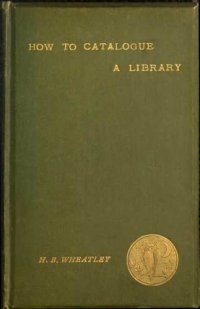
Ebook: How to Catalogue a Library Volume 1889-1938
Author: Wheatley Henry Benjamin
- Year: 2012
- Publisher: RareBooksClub.com
- Language: English
- epub
This historic book may have numerous typos and missing text. Purchasers can download a free scanned copy of the original book (without typos) from the publisher. Not indexed. Not illustrated. 1889 edition. Excerpt: ...it occurs with another name as respondent. That the term defendant is, when alone, synonymous with respondent. That when the respondent's name occurs with a prseses only, the respondent is the author except words are attached to the president's name affirming him to be the proponent, defendant, or author, or there is evidence in the preface or dedication that he claims the authorship. That the respondent when he is the author is frequently described as auctor respondens. That the opponent is never the author of a thesis. That dissertatio, disputatio, thesis, etc., are generally used synonymously, the same construction of words as to the authorship following each. And that when a collection of theses or dissertations is published under the name of a prseses as his "opera" it is merely in a secondary literary sense, viz., his having contributed opinions and corrections to the theses, or as being their editor. That the adoption of an asterisk in catalogues to denote an academical dissertation or thesis relieves us of the necessity of repeating a large amount of redundant wording to each title. It has been used successfully in the library of the Royal Medical and Chirurgical Society, and by Dr. Billings in his most valuable Index-Catalogue of the Library of the Surgeon-General's Office, United States. Head1ngs Other Than Author Head1ngs. Reports of trials are frequently difficult to catalogue, and some persons who are anxious to find an author for a book have considered the reporter as such. This I consider a hopeless mistake, for the name of the reporter is little likely to be retained in the memory of the searcher, who is sure to remember the subject of the trial. Mr. Cutter's remark upon this point is very just. He says: "It may be...
**